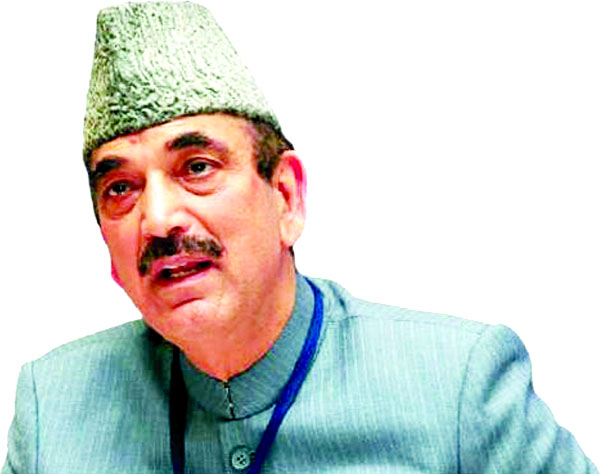DOGRA HERALD BUREAU
Srinagar, Apr 4
Former Jammu and Kashmir chief minister Ghulam Nabi Azad has pooh-poohed the claims made by rival National Conference and PDP that his newly- formed party was in cahoots with the BJP and asked whether they are the ‘B’ teams of the saffron party going by their past coalition arrangements.
Talking to PTI Videos, Azad, who is contesting on his Democratic Progressive Azad Party (DPAP), highlighted his party’s primary focus on reinstating full statehood to Jammu and Kashmir and not on the lines that union territories like Delhi and Puducherry enjoy.
To a question that his party was seen as a B team of the BJP, Azad pointed out past associations of regional parties with the saffron party.
“A and B team are those from the valley who have been ministers in the government of Atal Bihari Vajpayee, father of the BJP, or those who enjoyed governance with the help of saffron party MLAs in the erstwhile state,” he said.
He highlighted his independent political stance, emphasising the need for self-reflection among these parties before casting aspersions.
“I have never taken any support. In (Prime Minister Narendra) Modi’s time, I was the leader of opposition, not the minister. When I was chief minister, I did not get any support from the BJP. You know who those political parties are and they also must know that before pointing fingers at others, they should look at themselves first.”
The PDP had a political alliance with the BJP, with both late Mufti Mohammed Sayeed and Mehbooba Mufti serving as chief ministers and Omar Abdullah of National Conference was a Minister of State in the Vajpayee-led government in 1999.
Azad criticised the practice of labelling opponents as A, B, or C teams, attributing it to fear and asserting the importance of voter choice in elections.
“… People who fear a particular person, they start attacking him. It’s survival of the fittest. If people vote for me, let them vote. Let them select who can represent them in the Parliament,” he said.
With the Supreme Court’s directive to conduct assembly elections by September 30, Azad’s decision to prioritise the Lok Sabha polls underscores his commitment to engaging with critical issues in the region which included complete restoration of statehood, land and job rights and electricity issues.
On his decision to file nomination, Azad, who severed his five-decade-long ties with the Congress, reasoned that he was not sure when the assembly elections in Jammu and Kashmir will be held and hence decided to contest the Lok Sabha polls.
“I have one habit of taking risks and I’ve another habit of fighting from the front. I don’t escape beyond the shadow of somebody else. I fight from the front, whatever the consequences may be,” he asserted.
He said that while his agenda was assembly elections but in-between so many developments had taken place and he thought parliamentary elections are approaching and he should focus on that first.
Amid speculation that his party could be aligned with the BJP, Azad refuted these claims, asserting his independent stance and history of non-collaboration with the BJP during his tenures.
Asked about the allegation that the BJP is trying to divide the votes in (south) through DPAP, the veteran politician said he can pose a counter question to those leveling such allegations that they were cutting the votes of the DPAP.
Criticising the delimitation process in Jammu and Kashmir, Azad labeled it as impractical, particularly questioning the formation of the Anantnag-Poonch-Rajouri constituency, which he termed as a “non-practical exercise and done without any application of mind”.
“I’ve been told that it was done on Google. Thank God, there are not the parts from the other side (Pakistan). If you’re doing delimitation on the basis of Google, then God save us.
“It takes 18 hours to reach from Poonch district headquarters to Anantnag, including night halt. Which constituency in the world is where two areas are so far away from each other,” he said.
On his electoral prospects from the newly-carved Lok Sabha seat, Azad said he welcomed all the political parties who were participating in the elections. “I want democracy to flourish and reach out to the public. Now the voters have more choices to elect their leader.”
Besides restoration of statehood, he said the party would like to address the power crisis in Jammu and Kashmir.
“Thermal power projects are the need of the hour and this is the issue I want to raise in Parliament. Otherwise no industry will opt for this place.”



























